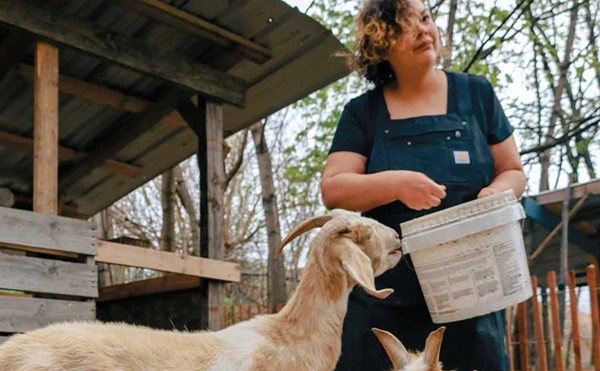In 2001 Joy Phillips and Amber Berndt began dating. Over the years the relationship became more serious and the couple began taking steps that would reflect the life they wanted to build with one another. They began wearing wedding bands, despite the fact that same-sex marriage was still banned in Michigan at the time. They bought two homes together. In 2005, after four years of being in a relationship, Berndt was artificially inseminated and the couple had their first child — a daughter. Three years later they had their second daughter.
Trouble, however, began in December 2014. Phillips and Berndt hit a rocky patch and decided, like many couples these days, to break up. There was just one big problem. Despite the fact that the girls, who go by the last name Berndt-Phillips, called both of these women “mom” and had been raised by the two of them, only one of the women was technically the children's biological mother. As far as the state of Michigan was/is concerned, Joy Phillips is a stranger — no different from a caretaker or a babysitter — with no legal rights to the children.
This stance is currently being challenged. After Amber Berndt, whose new partner got a job in Petoskey, made clear her intention to move there with the children, Phillips petitioned the court to make Berndt deal with custody issues which, according to court documents, had gotten so severe that Berndt had stopped allowing Phillips to see the kids or even speak with them on the phone.
The case is a fascinating one. In the previous absence of legally recognized relationships, such as marriages or civil unions, same-sex couples with children have run into serious problems if they do not take the necessary steps to protect the rights of their new families. The Kent County family court judge will have to determine how and if this summer’s Supreme Court ruling against same-sex marriage bans will play into the current mediation. If same-sex marriage had been around when the women were dating, Phillips would not be in the situation she is in today with no legal rights to the children she helped raise — so will the courts take the current norm into account?
Prior to the Supreme Court ruling there were few forms of recourse same-sex couples could take during or after a break — specifically when children are involved. While same-sex couples could enter into co-parent adoption agreements that would create a legal parent-child relationship for both adults, these complicated and costly procedures were rare for a number of reasons: most didn't even know they existed, monetary restraints and the failure to anticipate future problems.
As Jay Kaplan, the ACLU's LGBT Project attorney, writes in an email to Metro Times, “There certainly was not a Judge in Kent County willing to grant a petition for second parent adoption during the time that Phillips and Berndt were together, so it wasn’t an option in Michigan.”
Kaplan and his team at the ACLU have filed a brief, explaining that cases like Phillips and Berndt are likely to become more common now that the Supreme Court has ruled against same sex marriage bans.
MLive, who also reported on this case, paraphrased Kaplan bringing up a fascinating point about Berndt "betraying" the struggle of the LGBT community. "He considers using the laws that unconstitutionally prevented them from marrying to now gain advantage in a custody battle to be morally dubious at best," wrote MLive.
In other cases where judges have weighted in on same-sex custody the non-biological parent was granted legal standing since the couple had travelled to Canada or states where marriage was legal to tie the knot. Since Philips and Berndt never had a formal marriage, Berndt's attorney Scott Sherlund is arguing Phillips has no legal standing to custody. Phillips attorney Christine Yared, however, says the fact that same-sex marriage had been banned in Michigan and prevented a union should be taken into consideration — did the couple really need to spend the money on extra travel for a wedding to validate the fact that both were raising the children?
While this case — with the knowledge of the Supreme Court's ruling — trek into new waters, this is not the first time same-sex marriage custody battles have come up or been publicized. In 1999 Nancy Abrams published "The Other Mother: A Lesbian's Fight for Her Daughter," which detailed her complicated court battle to regain the rights she believed she had — to regain the daughter she spent almost a decade feeding, changing, bathing and hugging.
Abrams (a pseudonym) and her partner adopted a little girl in 1988. Six years later, after a messy break up, Abrams not only found herself out of love but out of luck—in the eyes of the Massachusetts courts, she was a stranger with absolutely no legal rights to her daughter.
In Abrams’ case, it became critical that her child was protected. In her novel, she writes of realizing after the break-up that her ex-partner was mentally unstable. Yet, since Abrams was not the biological parent of their daughter, the court ruled in her ex’s favor, casting Abrams aside as an outsider.
“I was not able to protect my daughter from a parent who had mental illness and couldn’t care for her,” said Abrams. “This could still happen in many places across the country, and that’s a crime.”
It was not until 1999, after a five-year legal battle, that the Massachusetts’ courts finally ruled in Abrams’ favor. To this day, she concludes the courts only listened to her because it became clear that her ex partner was in fact unable to care for their daughter—it would have been foster care or Abrams.
“As a lesbian, I had absolutely no rights in this case. None,” she said. “And if I were married, even if I were the non-biological parent, I would still have the legal tie of marriage.





